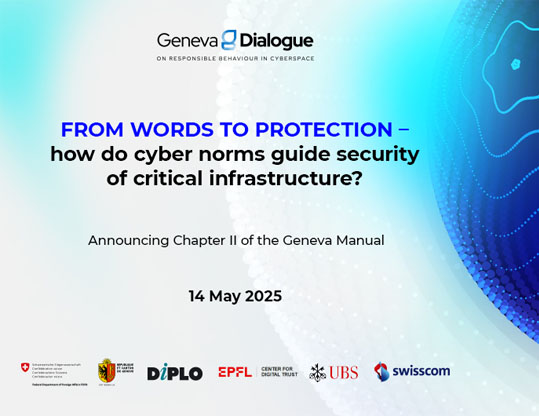
Dear friends,
Welcome to the second edition of the Geneva Dialogue Community Newsletter – this edition highlights three key trends shaping today’s cyber landscape.
First, there is a growing focus on cyber defence and cyberwarfare. The UK has announced the creation of a new Cyber and Electromagnetic Command, the USA is integrating generative AI into its cyber operations, and the Dutch Ministry of Defence is expanding its team of cyber reservists—demonstrating how digital capabilities are becoming central to national defence strategies.
Second, countries are taking important steps in setting new cybersecurity policy directions. Japan is developing a new national cybersecurity strategy, India has introduced AI incident reporting for critical infrastructure, and Denmark is working to reduce reliance on foreign software as part of its digital sovereignty efforts. Meanwhile, the EU and Australia are launching negotiations on a Security and Defence Partnership.
Finally, in the area of cyber norms and thanks to your contributions, the Geneva Dialogue has launched the second chapter of the Geneva Manual, focusing on how non-state stakeholders can implement the agreed cyber norms and confidence-building measures (CBMs) for the protection of critical infrastructure. This comes at a timely moment, as the UN’s Open-Ended Working Group (OEWG) – the primary forum for cyber discussions within the UN – approaches its concluding session in July.
As highlighted in Diplo’s analysis of the OEWG’s legacy (below), while progress has been made in reaffirming key norms and advancing voluntary cooperation, critical gaps remain, particularly in operationalising these norms and ensuring broader stakeholder engagement. The Geneva Dialogue’s work directly addresses this challenge by translating norms into actionable guidance and by reinforcing the role of industry, academia,the technical community, and civil society in supporting responsible state behaviour in cyberspace.
The Geneva Dialogue team
Highlights from the previous months
The OEWG on cybersecurity (2019–2025) shaped global debates on digital security—but did it deliver? External experts weigh in on its lasting impact, while our team, who tracked the process from day one, dissect the milestones and missed opportunities. Together, these perspectives reveal what’s next for cyber governance in a fractured world.
Brussels and Australia will launch negotiations on a non-binding Security and Defence Partnership to enhance cooperation in areas such as cyber threats, counter-terrorism, and defence industry collaboration.
Attackers published stolen internal data on dark web, UBS confirms.
Denmark’s Ministry of Digitalisation has begun phasing out Microsoft Office 365 and Windows, replacing them with LibreOffice and Linux as part of a government-wide initiative to enhance digital sovereignty and reduce dependence on US technology providers.
The UK’s National Cyber Security Centre has urged the government to adopt a strategic cybersecurity policy agenda, citing legislative delays and insufficient market incentives for secure technology development.
As India positions itself as a global leader in AI safety, a new framework could quietly reshape how nations prepare for algorithmic failures in critical systems.
As Africa’s digital landscape rapidly evolves, new alliances and fresh perspectives are emerging to shape the continent’s cybersecurity future from within.
President Donald Trump signed an Executive Order revising US cybersecurity policy by narrowing sanctions to foreign actors, revoking digital ID provisions, and directing new technical standards on encryption, AI, and software security.
As the digital battlefield expands, the UK is reshaping its military to confront invisible threats with a force designed for the age of cyber and electromagnetic warfare.
As Japan ramps up its cybersecurity efforts, a sweeping transformation is underway—one that could redefine how the country protects its digital infrastructure in the face of quantum-era threats and geopolitical tensions.
The Czech Republic blames China-linked hacking group for a breach on its foreign ministry network. China has dismissed allegations but NATO, the EU and the US stand behind Prague.
The Dutch Ministry of Defense is expanding its recruitment of cyber reservists—civilian cybersecurity professionals who support military cyber operations on a part-time basis—as part of its strategy to enhance national cyber defense capabilities.
The session titled ‘From words to protection – how do cyber norms guide security of critical infrastructure?’ took place on 14 May 2025 in Geneva, as part of the Global Conference on Cyber Capacity Building (GC3B) organised by the Global Forum on Cyber Expertise (GFCE). This session marked the launch of Chapter II of the Geneva Manual – a milestone in defining what the UN cyber norms mean for real-world protection of critical infrastructure.
The agency has outlined an AI roadmap with around 100 tasks to embed AI across logistics, security, and defence functions.














